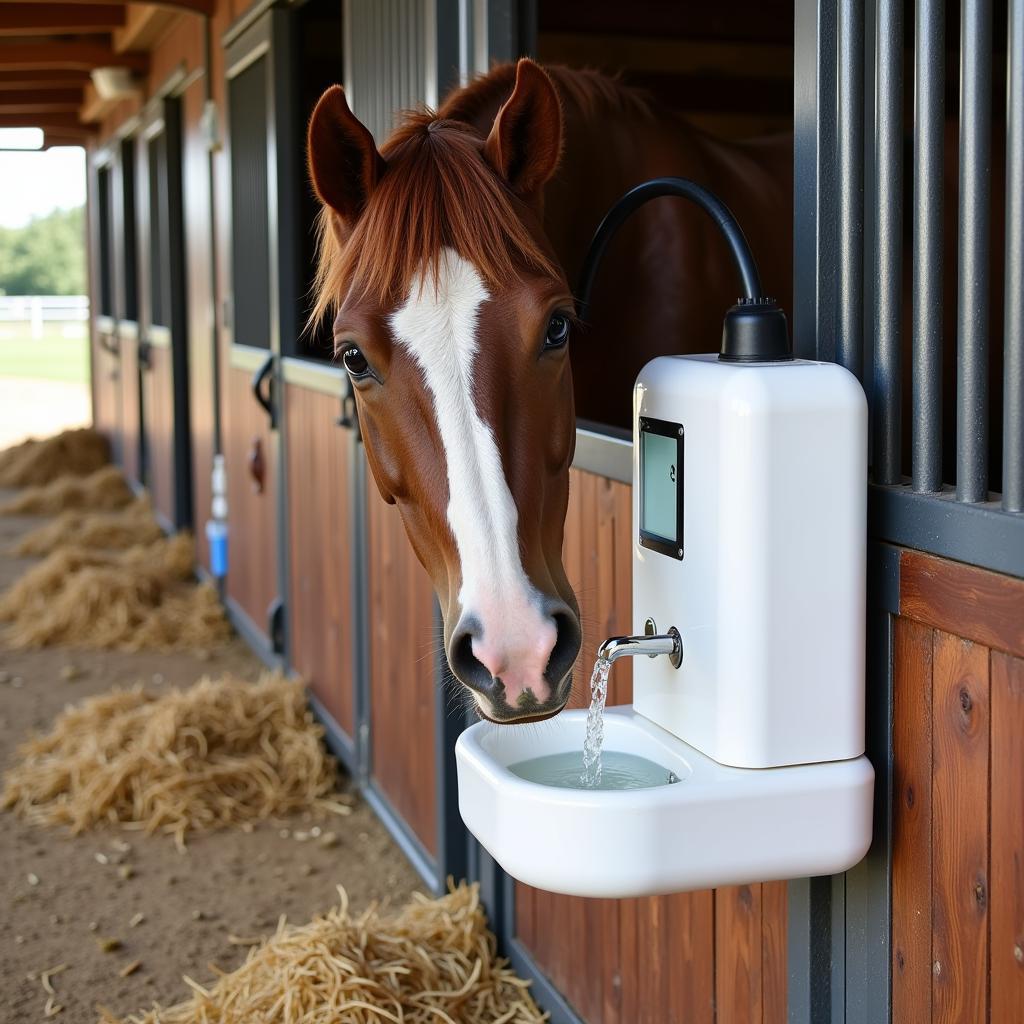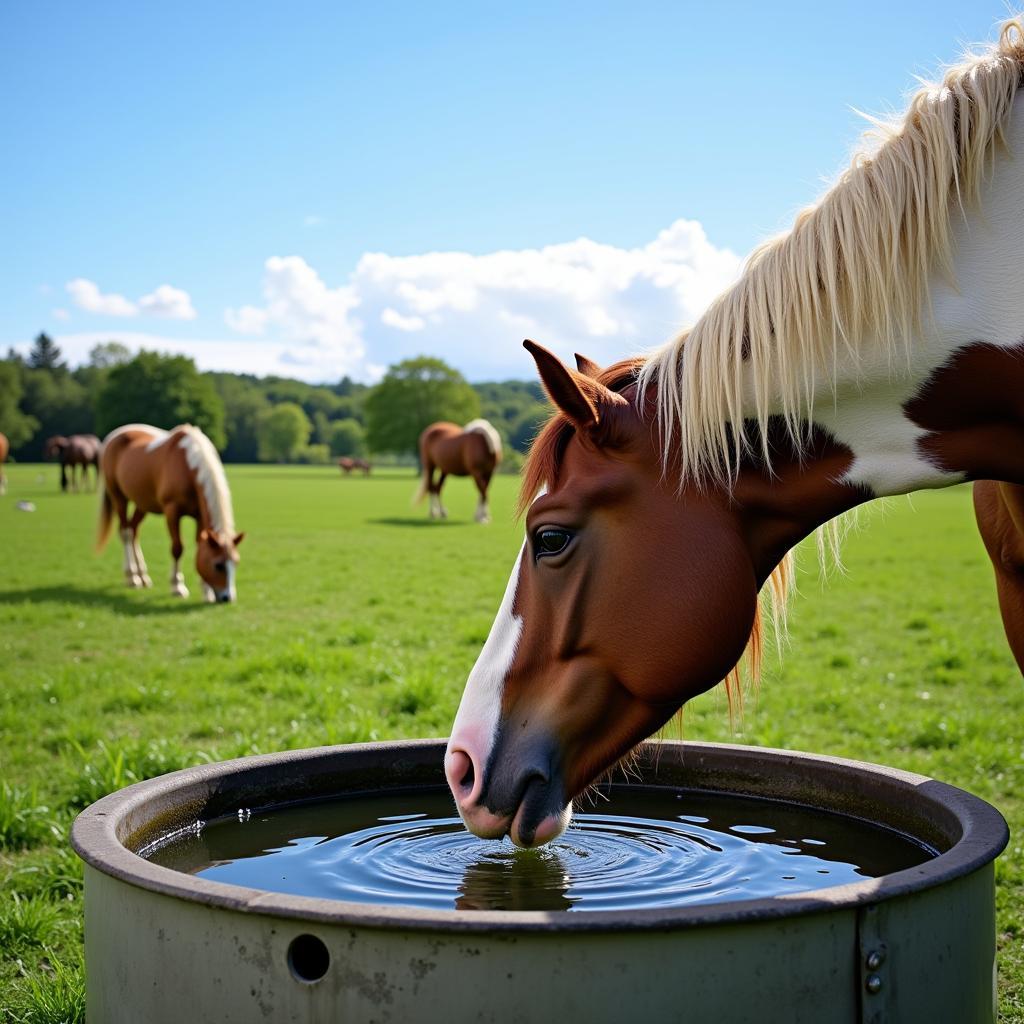Ensuring your horse has access to clean, fresh Chug Horse Water is fundamental to their health and well-being. Proper hydration impacts every aspect of a horse’s life, from performance and energy levels to digestion and overall health. This comprehensive guide will delve into the importance of equine hydration, the signs of dehydration, and best practices for providing your horse with the water they need.
Why is Chug Horse Water So Important?
Water is essential for a multitude of bodily functions in horses. It aids in digestion, nutrient absorption, joint lubrication, temperature regulation, and waste removal. Without sufficient chug horse water, a horse’s performance can suffer, and they become susceptible to a range of health problems, including colic and heatstroke.
The Science Behind Equine Hydration
A horse’s body is composed of approximately 65-70% water. This water is constantly being lost through sweating, respiration, urination, and defecation. Replenishing these fluids is crucial to maintain a healthy balance. When a horse doesn’t drink enough chug horse water, their body’s electrolyte balance is disrupted, which can lead to serious health consequences.
Signs of Dehydration in Horses
Recognizing the signs of dehydration is crucial for prompt intervention. These signs can include:
- Sunken eyes
- Dry gums
- Lethargy
- Loss of appetite
- Decreased urination
- Skin tenting (skin remains pinched when pulled)
If you notice any of these signs, it’s essential to contact your veterinarian immediately.
Providing the Best Chug Horse Water for Your Equine Friend
Offering clean, fresh chug horse water is the cornerstone of proper equine hydration. Here’s how to ensure your horse stays properly hydrated:
- Clean Water Sources: Regularly clean water troughs, buckets, and automatic waterers to prevent the buildup of algae, bacteria, and debris.
- Fresh Water Daily: Refresh your horse’s water supply daily, even if it hasn’t been fully consumed.
- Temperature Matters: Horses prefer lukewarm water, especially during colder months. Consider using heated buckets or trough heaters to prevent water from freezing.
- Water Availability: Ensure your horse has access to water at all times, both in the stable and pasture.
- Electrolyte Supplementation: During periods of intense exercise or hot weather, consider adding electrolytes to your horse’s water to replenish lost minerals.
 Automatic Waterer in Horse Stall
Automatic Waterer in Horse Stall
How Much Chug Horse Water Does a Horse Need?
The amount of chug horse water a horse needs varies depending on factors like size, activity level, weather conditions, and diet. A general guideline is that a horse should consume 5-10 gallons of water per day.
Factors Influencing Water Intake
- Exercise: Horses in heavy work will require significantly more water than those at rest.
- Weather: Hot and humid weather increases water loss through sweating, requiring increased water intake.
- Diet: Horses on dry hay consume more water than those on pasture, which has higher moisture content.
“Proper hydration is paramount for equine health,” says Dr. Emily Carter, DVM, specializing in equine sports medicine. “Providing ample clean, fresh water is the first step in preventing dehydration and ensuring your horse thrives.”
 Horse Drinking Water in Pasture
Horse Drinking Water in Pasture
Conclusion: Prioritizing Chug Horse Water for Optimal Health
Ensuring your horse has access to ample chug horse water is a fundamental aspect of responsible horse ownership. By understanding the importance of hydration, recognizing signs of dehydration, and implementing best practices for providing fresh, clean water, you can contribute significantly to your horse’s overall health, well-being, and performance.
FAQ
- How can I encourage my horse to drink more water? Try adding flavoring like apple juice or electrolytes, or offering soaked hay.
- What type of water trough is best? Stainless steel or heavy-duty plastic troughs are durable and easy to clean.
- Can horses drink too much water? While rare, it is possible. Consult your vet if you suspect your horse is drinking excessively.
- How often should I clean my horse’s water trough? Ideally, clean it daily or every other day.
- What are the signs of colic related to dehydration? Signs include pawing, rolling, flank watching, and lack of manure production.
Need further support? Contact us at Phone: 0772127271, Email: [email protected] or visit our location at QGM2+WX2, Vị Trung, Vị Thuỷ, Hậu Giang, Việt Nam. We have a 24/7 customer support team.